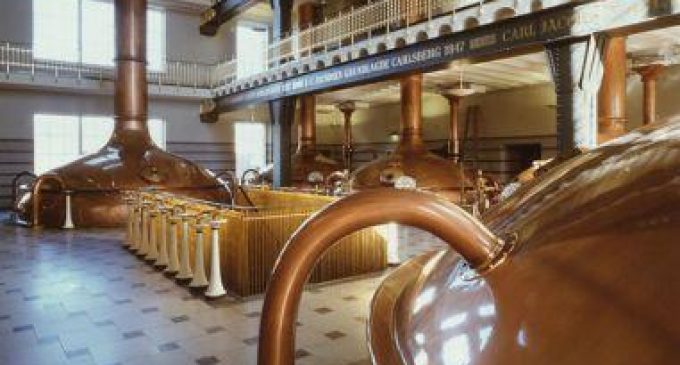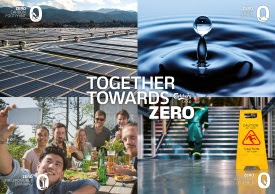Carlsberg to Achieve Zero Carbon Emissions at its Breweries by 2030

The Carlsberg Group has committed to eliminating carbon emissions and halving water usage at its breweries by 2030 as part of its new sustainability programme – Together Towards ZERO. An intermediate step includes the exclusive use of renewable electricity at its breweries by 2022.
Together Towards ZERO is a response to increasing consumer demand for sustainable products in a time of global challenges such as climate change, water scarcity and public health issues. The programme is an integral part of the Carlsberg Group’s SAIL’22 strategy and consists of four major ambitions – ZERO carbon footprint, ZERO water waste, ZERO irresponsible drinking and a ZERO accidents culture – each with individual and measurable targets (full overview in appendix 1).
 Together Towards ZERO has been developed in partnership with leading global experts using a science-based approach. It is aligned with the UN Sustainable Development Goals and sets out to deliver emission reductions that go beyond the base level of ambition set out in the Paris Agreement on climate change.
Together Towards ZERO has been developed in partnership with leading global experts using a science-based approach. It is aligned with the UN Sustainable Development Goals and sets out to deliver emission reductions that go beyond the base level of ambition set out in the Paris Agreement on climate change.
ZERO carbon footprint
- Climate change is one of the world’s most pressing issues and, as recognised in the Paris Agreement on climate change, businesses need to take action. The Carlsberg Group has worked with Carbon Trust, the independent not-for-profit expert, to set science-based targets for emission reductions at a level that would contribute to limiting global warming to 1.5°C, the higher level of ambition contained within the Paris Agreement.
- The Group is targeting ZERO carbon emissions at its breweries by 2030 and 100% use of renewable electricity at its breweries by 2022. Through the Carlsberg Circular Community, the Carlsberg Group is also engaging partners along the value chain to reduce beer-in-hand emissions1 by 30% by 2030.
ZERO water waste
- Today, there are too many areas of the world in which water is not being managed optimally, and water scarcity is a major concern. Working with experts from WWF, Carlsberg has identified breweries situated in areas with a high-risk of water scarcity and developed targets to support the ambition of ZERO water waste.
- The new targets include halving brewery water usage by 20302 and working with partners to improve water management in high-risk areas around selected breweries.
ZERO irresponsible drinking
- The misuse of alcohol and irresponsible behaviour such as drink driving and underage drinking must be prevented. It is often the result of a complex combination of societal and individual factors, and Carlsberg is working with a committee of international health and behavioural scientific experts to define actions that support consumers in making healthy, responsible choices.
- The new targets include offering 100% distribution of alcohol-free beer by 2022 to expand consumer choice, providing responsible drinking messaging and nutritional information online as well as on packaging, and forming partnerships to encourage responsible consumption.
ZERO accidents culture
- Work-related accidents are unacceptable, and employee health and safety always comes first. Carlsberg is working across its organisation, from production to sales and admin, to prevent accidents and build a ZERO accidents culture.
- The new targets include a year-on-year reduction in the accident rate in order to achieve the ambition of ZERO accidents.
 The ambitions and actions are driven by the Carlsberg Group’s purpose of brewing for a better today and tomorrow, and the Group will continue to work together with leading global experts to achieve the bold targets. Building on its strong scientific foundation, the Group will establish a community of young scientists led by the Carlsberg Research Laboratory – home to ground-breaking discoveries such as the pH scale, purified yeast and climate-tolerant crops. The Carlsberg Young Scientists’ Community will help foster further scientific developments within CO2, water and sustainable brewing – to the benefit of the Group and wider society.
The ambitions and actions are driven by the Carlsberg Group’s purpose of brewing for a better today and tomorrow, and the Group will continue to work together with leading global experts to achieve the bold targets. Building on its strong scientific foundation, the Group will establish a community of young scientists led by the Carlsberg Research Laboratory – home to ground-breaking discoveries such as the pH scale, purified yeast and climate-tolerant crops. The Carlsberg Young Scientists’ Community will help foster further scientific developments within CO2, water and sustainable brewing – to the benefit of the Group and wider society.
Cees ‘t Hart, CEO of the Carlsberg Group, comments: “Global challenges such as climate change and water scarcity require strong collective action, and with Together Towards ZERO we’re setting new industry standards for science-based and partnership-driven sustainability as part of our SAIL’22 strategy. We’re committed to delivering zero carbon emissions and halving water usage at our breweries by 2030. As a first action, we’ll switch to 100% renewable electricity by 2022 and cooperate with partners to protect shared water resources in selected water-scarce areas. I’m certain that in achieving our targets we’ll create efficiency improvements, risk reduction and a more resilient business that exists in harmony with local communities and the environment.”
 He adds: “Our clear targets and ambitions reflect the mentality of our founders to always strive for perfection and contribute to society through science. The world needs leadership, which is why we’ve made it a top priority to improve the world of tomorrow in support of the UN Sustainable Development Goals.”
He adds: “Our clear targets and ambitions reflect the mentality of our founders to always strive for perfection and contribute to society through science. The world needs leadership, which is why we’ve made it a top priority to improve the world of tomorrow in support of the UN Sustainable Development Goals.”
Tom Delay, Chief Executive of the Carbon Trust, says: “Just getting better is no longer good enough. Carlsberg’s ambitions go above and beyond the levels of carbon reduction that science tells us are necessary to keep global warming below 2 degrees Celsius. Carlsberg has taken a genuine leadership position on some of the most critical environmental issues the world currently faces, by developing an ambitious long-term business strategy that focuses on delivering a sustainable future.”
Jochem Verberne, Global Partnerships Director at WWF International, says: “WWF and the Carlsberg Group jointly analysed the water risks in their operations and the Group’s existing water strategy. We are delighted that Carlsberg has set an ambitious direction for other companies to follow as a result of this. It recognises that responsible water management requires technological breakthroughs at brewery level as well as collaboration with other stakeholders in high-risk catchment areas to secure long-term water availability for people, planet and businesses.”

































